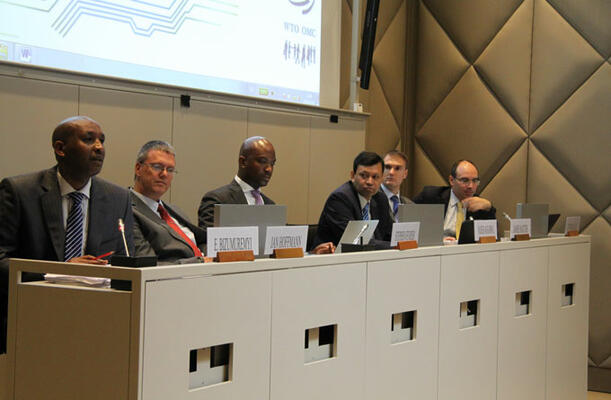
Consumers, SMEs stand to gain from Bali deal on trade facilitation
Trade facilitation has largely been beneficial but its effects have been unevenly distributed and panellists at a workshop at the WTO Public Forum on 3 October said that small and medium-sized enterprises (SMEs) and consumers in developing and least developed countries (LDCs) stood to gain significantly from a trade facilitation agreement.
‘A trade facilitation agreement is high on the agenda in the run-up to Bali,’ said James Baxter, Australia’s Deputy Permanent Representative to WTO, referring to the WTO Ministerial Conference that will be held in Bali in December.
Mr Baxter said that, although the costs are very real for a number of developing countries, businesses that stand to gain the most are in those countries that will implement trade facilitation measures.
Edouard Bizumuremyi, Commercial Attaché at the Permanent Mission of Rwanda to the United Nations and other international organizations in Geneva, illustrated the need for trade facilitation measures. He cited recent research from the United Nations Economic Commission for Africa that showed it takes African importers 37 days to bring in a container, whereas it takes 22 days in Asia and only 19 days in Latin America. In order to import goods into Africa, an average of nine different documents are required, whereas many parts of Asia require only four documents, he said.
The moderator of the panel, Rajesh Aggarwal, Chief of the Business and Trade Policy division at the International Trade Centre (ITC), provided further examples and noted that land-locked countries had an even greater need for trade facilitation.
‘Suppliers to the same automobile manufacturer will carry seven days of inventory in Italy, but 35 days in Morocco,’ Mr Aggarwal said.
The main objective of the session entitled ‘A workshop on trade facilitation: Addressing consumer and SME interests and concerns in developing countries’ was to identify related issues that are being discussed in the current WTO Trade Facilitation negotiations.
‘Trade facilitation is even more important for consumers today,’ said Jan Hoffmann, Chief of the Trade Facilitation Section at the United Nations Conference on Trade and Development (UNCTAD).
Panellists said that progress on the establishment of Trade Facilitation National Committees – the main entry point for consumers’ involvement – had been slow. Nonetheless, consumers have more at stake than wanting low-cost goods.
‘They want access to goods, maintenance of supply, post-purchase services and quality, as well as the flow of essential goods such as food, drugs and seeds,’ said David Vivas Eugui, Senior Advisor, CUTS International in Geneva.
Panellists said that encumbrances to trade such as high customs compliance costs and bottlenecks at borders had a proportionately greater effect on SMEs, which could entirely be shut out of the international trading system by delays and lack of predictability in trade rules.
‘In most developing countries, SMEs make up the biggest share of GDP but are also the biggest employer, so there is the social impact to consider,’ Mr Vivas said. ‘Many SMEs and traders do not use formal channels, which reduces income for the state. In reality, most SMEs trade regionally and intra-regionally and also produce intermediate goods.’
Among the trade facilitation measures that affect SMEs, Mr Hoffmann highlighted risk-assessment as a ‘win-win’. If done right, fewer documents and containers must be checked, even as the odds increase that customs officials will locate problematic or risky cases.
Mr Hoffmann said that other developmental benefits of trade facilitation for developing countries and LDCs include an increase in formal trade, which in turn increases revenue collection, as documented by countries that have implemented UNCTAD’s Automated System for Customs Data (ASCYUDA). Trade facilitation measures can also have spill-over effects, such as improving information technology, improving governance, empowering women and strengthening regional integration, he said.
‘Much of trade facilitation is about fixing problems,’ concluded ITC’s Mr Aggarwal. ‘Once the WTO agreement is finalized, ITC stands ready to help implement transparency, to reach out to the private sector and to help them take advantage of new opportunities.’



